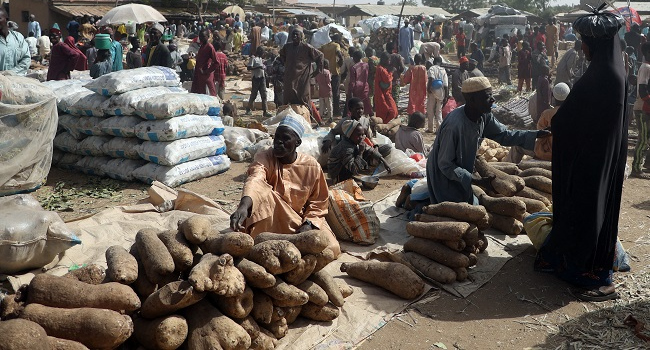
The Nigerian Army has mobilized officers to protect farmers across the North West and North Central regions, according to a statement by Maj. Gen. Edward Buba, the Director of Defence Media Operations. This strategic deployment aims to facilitate uninterrupted farming activities, enabling farmers to plant without fear of attacks, which is crucial for achieving a bountiful harvest.
This measure comes at a time when Nigeria is grappling with severe food shortages, further exacerbated by skyrocketing food inflation. The National Bureau of Statistics (NBS) reported that food inflation surged to over 40%, contributing significantly to the country’s overall inflation rate. While Nigeria’s inflation rate peaked at 34.19% in June 2024, it slightly eased to 33.40% in July, according to NBS data.
Food Inflation Reaches 40.8%
The NBS provided a detailed analysis of the food inflation spike. In June 2024, food prices rose by 40.87% compared to the previous year, an increase of 15.62 percentage points from June 2023, when the rate was 25.25%. The sharp rise in food prices was driven by higher costs of staple items like millet, garri, guinea corn, yam, cocoyam, groundnut oil, and palm oil.
On a monthly basis, food inflation in June 2024 was recorded at 2.55%, reflecting a 0.26% increase from May 2024. The average annual food inflation rate for the 12 months ending in June 2024 was 35.35%, which marked an 11.31 percentage point increase from the previous year’s rate of 24.03%.
Core inflation, which excludes volatile agricultural produce and energy, also saw a significant increase, standing at 27.40% in June 2024, up from 20.06% in June 2023.
Regional Disparities in Food Inflation
The NBS data highlighted regional differences in food inflation. Edo State recorded the highest year-on-year food inflation rate at 47.34%, followed by Kogi (46.37%) and Cross River (45.28%). On the other hand, Nasarawa (34.31%), Bauchi (34.78%), and Adamawa (35.96%) reported the lowest increases.
On a month-to-month basis, Yobe (4.75%), Adamawa (4.74%), and Taraba (4.12%) saw the highest spikes in food prices in June 2024. Meanwhile, Nasarawa (0.14%), Kano (0.96%), and Lagos (1.25%) recorded the slowest increases.
Experts have attributed the rising food inflation to several factors, including insecurity, inadequate farming equipment, and other systemic challenges hampering food production in the country.
Government’s Response to the Crisis
In response to the soaring food prices, the Federal Government has introduced several measures aimed at mitigating the crisis. Among these is the temporary suspension of duties, tariffs, and taxes on the importation of key commodities such as maize, brown rice, wheat, and cowpeas for 150 days. This suspension applies to imports through both land and sea borders.
Additionally, the government has approved the procurement of 2,000 tractors and 1,200 trailers to support agricultural production. A special committee has also been established to devise further solutions to the ongoing food crisis.
For more updates, join our WhatsApp channel: WhatsApp Channel.